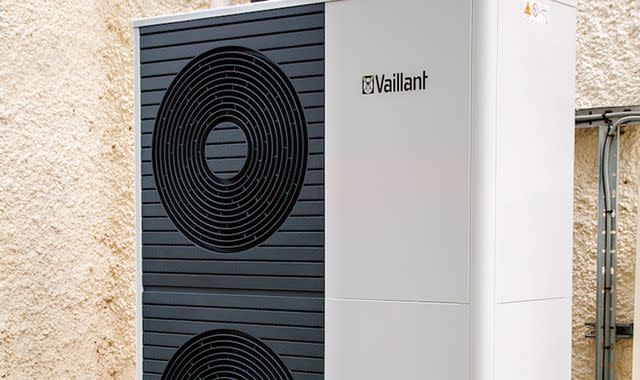Thousands of households miss out on £5,000 grant amid warning of 'inadequate' boiler scheme

Thousands of households are missing out on a £5,000 grant that could help them upgrade their boilers and cut their energy bills, amid warnings the government scheme is "failing to deliver".
Last year, the government announced a £450m Boiler Upgrade Scheme - part of more than a £3.9bn package designed to cut carbon from heating and buildings.
But as of January, just a third of the funding pot has been allocated, with 9,889 vouchers issued worth a total value of £49.7bn.
Now the House of Lords has warned the scheme is "failing to deliver" due to the "disappointingly low" uptake of grants.
Cost of living latest: Four-day week breakthrough
In a letter sent to Lord Callanan, Parliamentary Under Secretary of State for Energy Security and Net Zero, today the Environment and Climate Change Committee warned if the current take-up rate continues, only half of the allocated budget will be used to help households switch to low-carbon heating systems.
This means the government is unlikely to meet its 2028 target of 600,000 installations per year.
What is the boiler upgrade scheme?
Through the scheme, households are given a grant to cover part of the cost of replacing fossil fuel heating systems - including oil, gas or electric - with a heat pump or biomass boiler.
Ministers have previously said this will cut emissions and reduce the UK's dependency on fossil fuels, mitigating some of its exposure to global price spikes in gas.
The grants were available from last April which means people installing a heat pump will pay a similar amount to those installing traditional gas boilers.
While a replacement gas boiler can cost around £1,000 to £3,000, an air source heat pump can cost between £7,000 and £14,000.
What is a heat pump?
A heat pump captures heat from outside and moves it into your home.
It uses electricity to do this, however, the quantity of heat delivered into your home is much greater than the quantity of electricity used to power the system.
As a heat pump captures heat that is already present in the environment, the system itself does not burn any fuel and therefore emits no carbon dioxide.
The heat is taken from the outside and used to warm a liquid refrigerant and turned into a gas. This gas is then transferred to your central heating system.
What has gone wrong with the scheme?
The House of Lord's Energy and Climate Committee said public awareness of low-carbon heating systems is very limited, and the promotion of the upgrade scheme has been "inadequate".
It also found a shortage of heat-pump installers and insufficient independent advice for homeowners.
Hydrogen, it added, is not a serious option for home heating for the short to medium-term and misleading messages, including from the government, are negatively affecting the take-up of established low-carbon home heating technologies like heat pumps.
The committee is now calling on the government to provide greater clarity and roll over the leftover first-year budget into the second year, alongside a review that could look to extend the scheme.
It also wants the government to correct the Energy Performance Certificates (EPC) methodology so that certificates properly reward households for making the switch to low-carbon heating and flawed EPC recommendations cease being a barrier to eligibility.
How do you apply for it?
The scheme is open to people in England and Wales. If you live in Scotland you might be able to get an interest-free loan or grant to make your home more energy efficient. If you live in Northern Ireland, you may be eligible for a grant to replace your boiler.
Once you have worked out if you are eligible, you can contact suitable MCS-certified installers to get quotes for the work and agree a quote with your chosen installer.
Click to subscribe to the Sky News Daily wherever you get your podcasts
The installer will apply on your behalf on the Ofgem website and the value of the grant will be taken off the amount you pay for installation.
Ofgem may contact you to confirm an installer is acting on your behalf.

 Yahoo News
Yahoo News 
